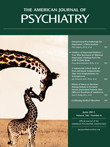A Nationwide Cohort Study of Oral and Depot Antipsychotics After First Hospitalization for Schizophrenia
Abstract
Objective:
Data on the effectiveness of antipsychotics in the early phase of schizophrenia are limited. The authors examined the risk of rehospitalization and drug discontinuation in a nationwide cohort of 2,588 consecutive patients hospitalized for the first time with a diagnosis of schizophrenia between 2000 and 2007 in Finland.
Method:
The authors linked national databases of hospitalization, mortality, and antipsychotic prescriptions and computed hazard ratios, adjusting for the effects of sociodemographic and clinical variables, the temporal sequence of the antipsychotics used, and the choice of the initial antipsychotic for each patient.
Results:
Of 2,588 patients, 1,507 (58.2%) collected a prescription for an antipsychotic during the first 30 days after hospital discharge, and 1,182 (45.7%, 95% confidence interval [CI]=43.7–47.6) continued their initial treatment for 30 days or longer. In a pairwise comparison between depot injections and their equivalent oral formulations, the risk of rehospitalization for patients receiving depot medications was about one-third of that for patients receiving oral medications (adjusted hazard ratio=0.36, 95% CI=0.17–0.75). Compared with oral risperidone, clozapine (adjusted hazard ratio=0.48, 95% CI=0.31–0.76) and olanzapine (adjusted hazard ratio=0.54, 95% CI=0.40–0.73) were each associated with a significantly lower rehospitalization risk. Use of any antipsychotic compared with no antipsychotic was associated with lower mortality (adjusted hazard ratio=0.45, 95% CI=0.31–0.67).
Conclusions:
In Finland, only a minority of patients adhere to their initial antipsychotic during the first 60 days after discharge from their first hospitalization for schizophrenia. Use of depot antipsychotics was associated with a significantly lower risk of rehospitalization than use of oral formulations of the same compounds. Among oral antipsychotics, clozapine and olanzapine were associated with more favorable outcomes. Use of any antipsychotic was associated with lower mortality.



